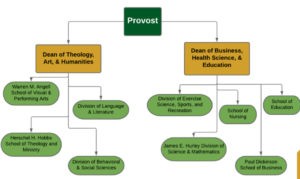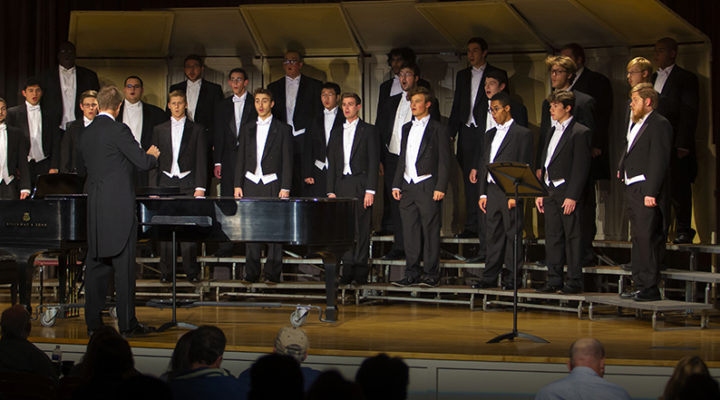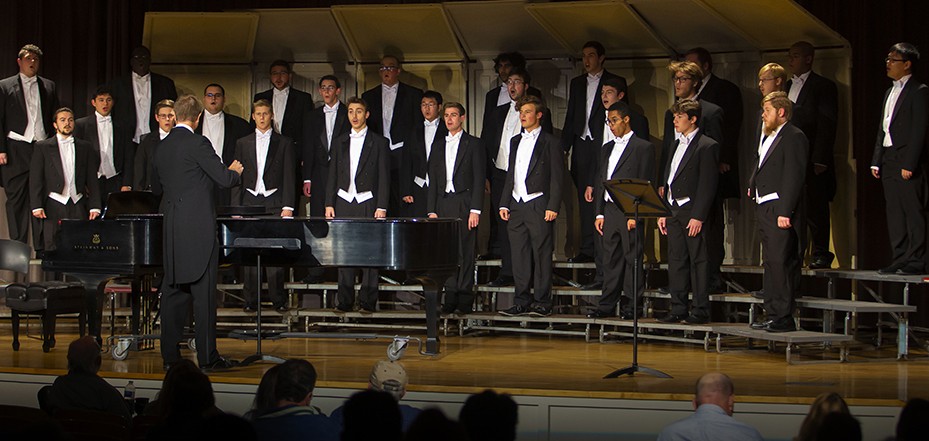This story was updated with additional information from the university Saturday evening, March 6.
One of the premier schools of music among Baptist universities will be affected by restructuring this summer, prompting alumni and current students to protest its perceived diminution and the university to counter that no status will be lost.
News of changes to the Warren M. Angell College of Fine Arts at Oklahoma Baptist University broke on Facebook March 4. The school located in Shawnee, Okla., had issued no news release or comment on the changes until contacted by Baptist News Global.
 Documents obtained by BNG that were distributed to students indicate the university will undergo a restructuring this summer, moving from six distinct undergraduate colleges to two larger administrative units led by deans. These two units, although apparently not to be called “colleges” as in the current sense, will group theology, arts and humanities under one dean, and business, health science and education under another dean.
Documents obtained by BNG that were distributed to students indicate the university will undergo a restructuring this summer, moving from six distinct undergraduate colleges to two larger administrative units led by deans. These two units, although apparently not to be called “colleges” as in the current sense, will group theology, arts and humanities under one dean, and business, health science and education under another dean.
Currently, the six undergraduate colleges are led by deans for the College of Business, College of Fine Arts, College of Humanities and Social Sciences, College of Nursing, College of Science and Mathematics, College of Theology and Ministry. Now there will be two deans with “academic chairs” reporting to them for the nine units. Five of those units will bear the name “School” and four will be called “Divisions.”
Both the College of Fine Arts and the College of Theology and Ministry (named for legendary Oklahoma Baptist pastor Herschel Hobbs) will be subsumed into the new administrative unit for theology, arts and humanities, according to an organizational chart.
The Warren M. Angell College of Fine Arts will be renamed as the Warren M. Angell School of Visual and Performing Arts, “a name suggested by the faculty during an academic meeting with the provost,” the university administration said. “The name change from ‘College’ to ‘School’ does not represent a loss of status. The music faculty and programs will continue to be overseen by an academic chair.”
University administrators met with students March 4, according to sophomore music major Connor Eshelman, who is among those taking to social media to appeal to alumni and friends to protest the changes.
Eshelman said he believes the administration “has only the best intentions at heart” but like other students and alumni wishes the outcome would be different and believes the changes diminish the stature of the well-known music school.
Although the school of music will continue in a new form, “our beloved school of music and Warren M. Angell College of Fine Arts will no longer exist as we know it.”
Although the school of music will continue in a new form, “our beloved school of music and Warren M. Angell College of Fine Arts will no longer exist as we know it,” he wrote.
Echoing concerns of students and alumni at other universities that have gone through massive restructuring lately, Eshelman lamented that students did not get their questions answered at the forum. “In the one hour meeting we did not cover more than a few questions. The majority of the time was spent being reassured that the administration is supportive of the School of Music and that they understand the value it adds to our university. Yet, no questions were given a direct answer.”
In response to student and alumni concerns and in response to a request for information from BNG, the university on Saturday evening, March 6, released a statement seeking to quell “a large amount of misinformation circulating on social media.”
“OBU cherishes the rich history of music and the Warren M. Angell College of Fine Arts on Bison Hill,” the statement said. “The music program is alive and well at OBU. Rumors being shared of a closure are unequivocally false. Music is an integral part of the Christian liberal arts higher education provided at OBU and will be for decades to come. We continue to offer a bachelor of musical arts, bachelor of music education (instrumental and vocal), bachelor of music in composition, bachelor of music in voice performance, and a bachelor of music in piano performance with pedagogy emphasis. Students who are interested in a degree in worship may obtain a bachelor of arts in worship studies.”
“Rumors being shared of a closure are unequivocally false.”
The reorganization “is the culmination of a process spanning almost two years, with collaboration among university administrators, college deans, division chairs and faculty,” the statement said. “The academic organization changes are intended to bring more faculty to the leadership table, to facilitate better communication between the university’s academic areas and to create a more cost-effective structure for the university to position OBU well for the future.”
Even before COVID-19, smaller private colleges and universities faced daunting financial challenges. Many of them, like OBU, had expanded beyond their liberal arts roots to offer more expansive programs and a diversity of majors to attract more students. Funding such a diverse educational offering takes money.
Thus, in one of the first signs of financial contraction, OBU announced in November 2020 that it would eliminate seven varsity athletics programs: men’s golf, men’s soccer, men’s and women’s swimming and diving, men’s and women’s tennis, and women’s lacrosse. This was part of a $3 million reduction in the university’s athletic budget.
The latest restructuring news appears to be further driven by financial concerns.
These changes reportedly include the anticipated departure of some current deans whose colleges are being changed in status and loss of at least three faculty positions within the school of music. The university’s website currently lists 12 members of the music faculty.
Eshelman represents a multi-generation OBU family, with ties back to the 1940s. His parents previously worked at the university.
“I understand I will obtain my degree, but it will not be with the professors or in the same high-quality manner that I signed up for.”
Although the university says it will honor his and other students’ degree plans, “music majors and many other students do not believe that the administration understands the value of a strong music department,” he said. “I understand I will obtain my degree, but it will not be with the professors or in the same high-quality manner that I signed up for.”
Among the constellation of faith-based colleges and universities in America, OBU from the mid-20th century onward gained a reputation as a top-tier music school. Its graduates serve in prominent churches across the nation, as missionaries, educators, administrators and performers.
The College of Fine Arts is named for a legendary dean, Warren Angell, who served in that post 37 years. Angell was so widely regarded that the school of fine arts was named for him while he was still living and still working.
While working on his doctorate at Columbia University, Angell sang with Fred Waring’s Pennsylvanians and was an arranger and soloist with the Robert Shaw Chorale. He directed the Tuneclippers on USO tours of Europe and the Far East and performed with Bob Hope.
His successor, James Woodward, further solidified OBU’s national reputation as a music powerhouse. Woodward directed the Singing Churchmen of Oklahoma and later traveled on weekends to Los Angeles, where he led the music program for Robert Schuller’s Crystal Cathedral during its prime.
As news of the upcoming changes spreads across social media, alumni are swapping information as it becomes available — filling a vacuum created by lack of information from the university itself. For example, current students and alumni are reporting that the marching band has been moved from the school of music to the athletic department.
A recent article in Forbes magazine set the larger context for what is playing out at OBU.
“With students seeking lower-cost alternatives over traditional brick-and-mortar schools, a growing number of online courses, employers questioning the value of a degree and no visible end to off-campus regulations, music education will likely be forever changed due to the pandemic,” wrote Brian Penick.
This trend, however it plays out, will no doubt affect Baptist colleges and universities nationwide because of their historical connection to music education and performance — a reality rooted in the importance of choral and instrumental music in church worship, which also has changed dramatically in recent years.
Related articles:
What should it cost a denomination to control governance of a university?
Hardin-Simmons trustees stand by decision to close Logsdon Seminary


